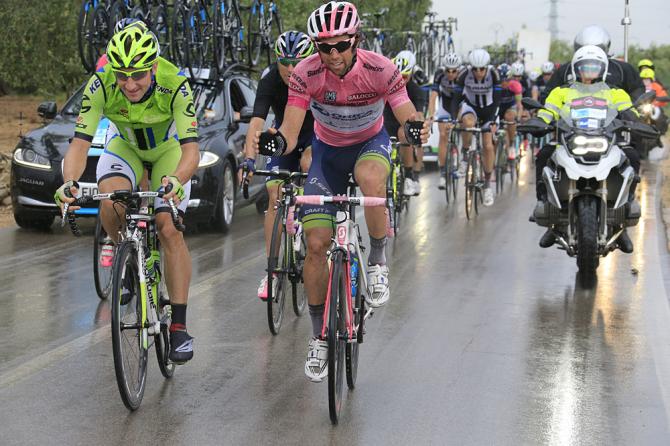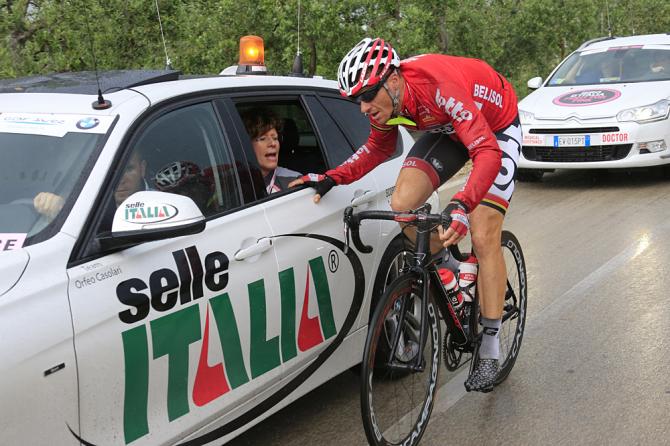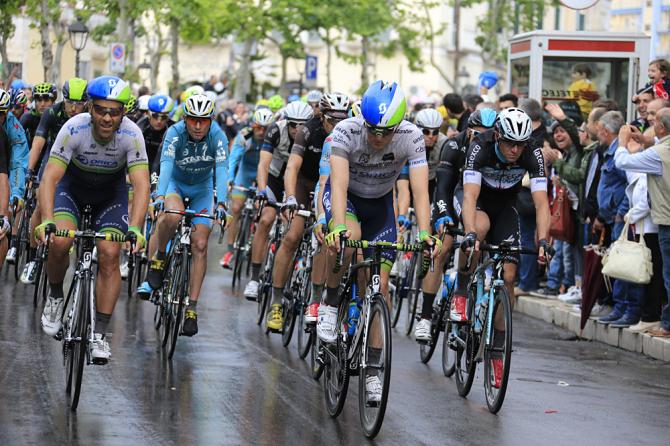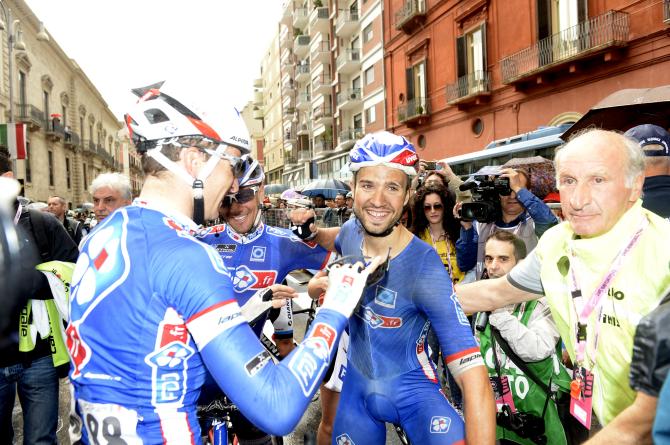Giro d’Italia peloton welcomes decision to neutralise final lap of Bari stage
Quinziato, Petacchi, Viviani and Paolini downplay the polemica




The Giro d’Italia returned to Italian roads on Tuesday and, as if to mark the occasion, the first real polemica of the race threatened to break out in tandem with the rain showers that fell over Bari on stage 4, where the final lap of the finishing circuit was ultimately neutralised due to the conditions.
A cursory glance at the Garibaldi – the Giro road book – showed a series of tight 90-degree corners in the 8.3 kilometre finishing circuit, and when dark clouds formed over the start in Giovinazzo and leaden drops began to fall, there were already concerns in the peloton regarding the safety or otherwise of the day’s stage.
An early crash at Molfetta hardened the resolve of the riders and an unofficial truce was called as they discussed what course of action to take with race regulator Marco Velo, who follows the race on the pillion of a motorbike at the front of the peloton. The early rain had eased by that point, but word began to filter through the pack that the final lap of the race would be neutralised in the event of further showers.
Once on the finishing circuit, with the Orica-GreenEdge team of Michael Matthews on the front, the pace remained sedate but the remonstrations among some of the riders were anything but as negotiations continued and confusion reigned.
Manuel Quinziato (BMC), in particular, appeared frustrated with GreenEdge’s slow pace, but he explained afterwards that it was simply due to a linguistic misunderstanding. The Australian squad thought that the peloton was minded to stop on the next passage through the finish line and discuss matters further, but by that point, the commissaires had already decided that the final lap would be neutralised.
"It made no sense to stop, that would not be a smart move at all," Quinziato said. "They heard from radio that they should stop but that was wrong. They understood they had to, but it was not their idea. We said to keep going, get to the last lap and then the guys who wanted to sprint could sprint."
That brief misapprehension apart, however, there seemed to be broad consensus in the bunch that the decision to neutralise the final lap and remove time bonuses from the stage was the correct one. "I think we have to congratulate the organisation. They managed the situation really well because it was raining and when it rains in the south of Italy, where it doesn’t rain often, the roads are very slippery. It’s not like Ireland," Quinziato said.
The latest race content, interviews, features, reviews and expert buying guides, direct to your inbox!
"There was a moment when everyone got scared and it was hard to take a decision in the race, but then we got the news that the last lap was neutralised. That was really important because it meant that teams like ours with a GC rider could fight for position until there and then we could let the guys brave enough to sprint do that."
Another of the peloton’s elder statesmen, Luca Paolini (Katusha), was prominent in the discussions at the head of the race and he felt that the call to neutralise the final 8 kilometres was a sensible one. "We and the other teams riding for the general classification asked for confirmation of the safety of the finishing circuit and the neutralisation of the last lap, and the organisation listened to us," he said.
Alessandro Petacchi (Omega Pharma-QuickStep) was called to appear on the house that polemica built, RAI television’s post-stage analysis show Processo alla Tappa, where the default setting is typically one of indignation, but he looked to downplay any outcry over the day’s events.
"I spoke with Velo and [Giro director Mauro] Vegni and in the end I was sorry that they took away the time bonuses because today I had it in mind to do the sprint but it was the most sensible decision," said Petacchi, who is just 8 seconds – or one winner’s time bonus – off the maglia rosa. "It’s easy to criticise from a car or from television but I can assure you that it was difficult to stay upright."
Final lap crash
Quinziato dismissed the idea that the circuit was too dangerous – "I do the Eneco Tour and that’s worse than here" – and declared himself pleased that a compromise had been reached to allow the race continue with a minimal threat to the GC hopes of the likes of Cadel Evans. "A bike race has some risks but today we reduced it to the minimum. It was just bad luck that on the last lap it started raining a little bit more," he said.
Indeed, once on that final lap, the heavens opened once more and as the pace shot up for the finishing sprint, it was all but inevitable that there would be a crash. When Daniele Ratto’s wheels slipped from under him, he brought a number of riders down, although his Cannondale teammate Elia Viviani managed to pick his way through the carnage and take 5th on the stage.
"We’re here to ride our bikes and risks are part of our job. I think that the decision taken by the jury was smart because it limited the number of riders in the finale," Viviani said. "In my opinion, there’s no sense in making a polemica out of it."
Giacomo Nizzolo (Trek Factory Racing) took second on the stage behind Nacer Bouhanni (FDJ.fr) after a fragmented finishing sprint and he put the day’s events into perspective when he wheeled to a halt. "Getting 200 people to agree isn’t simple but in the end we had the best scenario possible considering the weather and the design of the finale."

Barry Ryan was Head of Features at Cyclingnews. He has covered professional cycling since 2010, reporting from the Tour de France, Giro d’Italia and events from Argentina to Japan. His writing has appeared in The Independent, Procycling and Cycling Plus. He is the author of The Ascent: Sean Kelly, Stephen Roche and the Rise of Irish Cycling’s Golden Generation, published by Gill Books.